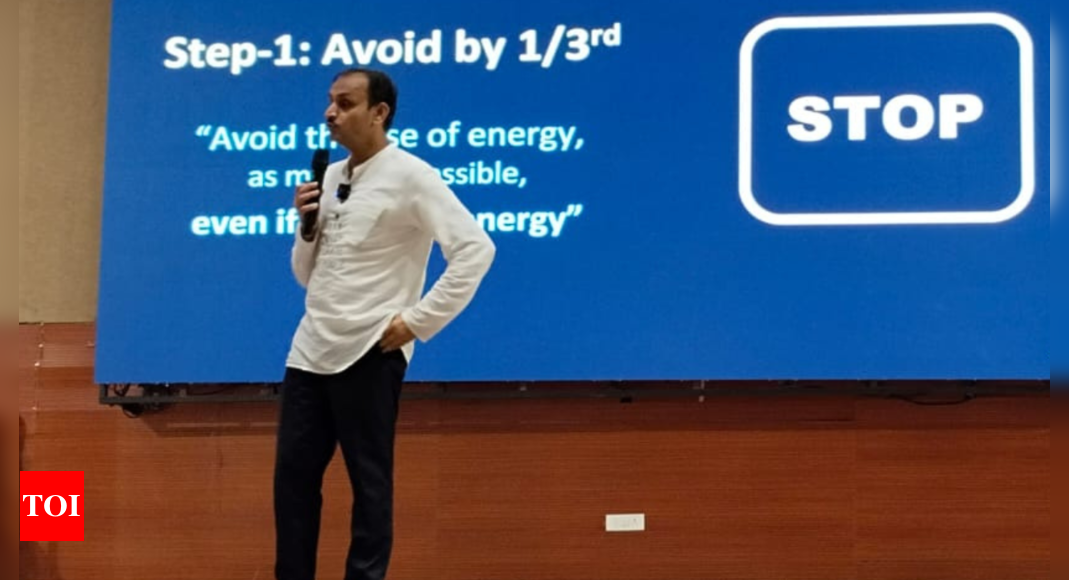
RAIPUR: IIT Mumbai professor Chetan Singh Solanki has stressed the urgent need for energy conservation and a global shift to renewable energy to tackle climate change.
Highlighting the lack of climate awareness among the youth, Solanki advocated for the “Avoid, Minimize, Generate” strategy as key to mitigating the crisis. The IIT professor was speaking at a lecture session hosted by Pandit Ravishankar Shukla University on ‘Environment-Friendly Energy Product Startups.’ The lecture provided a comprehensive ‘6-Point Understanding’ of climate change, focusing on the challenges and necessary corrective actions.
Speaking to TOI on the sidelines of the session, Prof.Solanki said many young people are increasingly unaware of climate change, with some not even discussing the issue. He attributed this to the lack of emphasis or discussion from influential figures in their lives, such as parents, teachers, professors, influencers, and spiritual leaders. Even when climate change is addressed, it is often only at a superficial level, leaving young people with a shallow understanding of the issue.
Since November 2020, Solanki has travelled to various cities and countries, discovering that climate issues are prevalent everywhere. He emphasized that unless individuals adopt the ‘Avoid, Minimize, Generate’ approach—three essential steps toward energy conservation—the situation will become increasingly challenging for future generations.
During the lecture, Solanki provided practical advice on energy conservation, such as avoiding unnecessary tasks that consume energy. He highlighted that almost every activity, from buying clothes to using electronic devices, releases harmful energy into the atmosphere, contributing to the degradation of the air, water, and food that sustain us.
He also pointed out that the continuous development of new technologies and gadgets, often introduced every two to three months, exacerbates this issue by generating more harmful energy. Referring to thermodynamics, Solanki noted, “The higher the entropy, the greater the disorder.”
He outlined six key points, addressing ‘what,’ ‘why,’ and ‘who’ is responsible for climate change. He also posed critical questions about ‘how,’ ‘who,’ and ‘what’ actions can be taken to address the issue. The conclusion emphasized personal responsibility, highlighting the role of individuals in the drastic changes occurring in the climate.
Discussing potential solutions, Solanki urged a focus on the necessities of life and advocated for transitioning to 100 percent solar energy, limiting consumption, and localizing production. He further remarked, “Amid the growing challenges of climate change and rising global temperatures, the world must move towards adopting 100 per cent renewable energy to limit the average increase in global temperature to two degrees Celsius.”
Solanki said he has embarked on a nationwide journey in a solar-powered bus equipped with amenities such as an air-conditioned bedroom, office space, kitchen with an induction cooker, and a refrigerator—all powered by solar panels on the roof. “This innovative mobile abode is not just a mode of transportation but a symbol of our aspirations for a sustainable, energy-efficient future,” he stated.
Highlighting the lack of climate awareness among the youth, Solanki advocated for the “Avoid, Minimize, Generate” strategy as key to mitigating the crisis. The IIT professor was speaking at a lecture session hosted by Pandit Ravishankar Shukla University on ‘Environment-Friendly Energy Product Startups.’ The lecture provided a comprehensive ‘6-Point Understanding’ of climate change, focusing on the challenges and necessary corrective actions.
Speaking to TOI on the sidelines of the session, Prof.Solanki said many young people are increasingly unaware of climate change, with some not even discussing the issue. He attributed this to the lack of emphasis or discussion from influential figures in their lives, such as parents, teachers, professors, influencers, and spiritual leaders. Even when climate change is addressed, it is often only at a superficial level, leaving young people with a shallow understanding of the issue.
Since November 2020, Solanki has travelled to various cities and countries, discovering that climate issues are prevalent everywhere. He emphasized that unless individuals adopt the ‘Avoid, Minimize, Generate’ approach—three essential steps toward energy conservation—the situation will become increasingly challenging for future generations.
During the lecture, Solanki provided practical advice on energy conservation, such as avoiding unnecessary tasks that consume energy. He highlighted that almost every activity, from buying clothes to using electronic devices, releases harmful energy into the atmosphere, contributing to the degradation of the air, water, and food that sustain us.
He also pointed out that the continuous development of new technologies and gadgets, often introduced every two to three months, exacerbates this issue by generating more harmful energy. Referring to thermodynamics, Solanki noted, “The higher the entropy, the greater the disorder.”
He outlined six key points, addressing ‘what,’ ‘why,’ and ‘who’ is responsible for climate change. He also posed critical questions about ‘how,’ ‘who,’ and ‘what’ actions can be taken to address the issue. The conclusion emphasized personal responsibility, highlighting the role of individuals in the drastic changes occurring in the climate.
Discussing potential solutions, Solanki urged a focus on the necessities of life and advocated for transitioning to 100 percent solar energy, limiting consumption, and localizing production. He further remarked, “Amid the growing challenges of climate change and rising global temperatures, the world must move towards adopting 100 per cent renewable energy to limit the average increase in global temperature to two degrees Celsius.”
Solanki said he has embarked on a nationwide journey in a solar-powered bus equipped with amenities such as an air-conditioned bedroom, office space, kitchen with an induction cooker, and a refrigerator—all powered by solar panels on the roof. “This innovative mobile abode is not just a mode of transportation but a symbol of our aspirations for a sustainable, energy-efficient future,” he stated.







